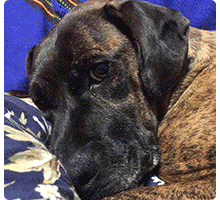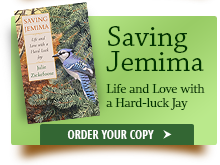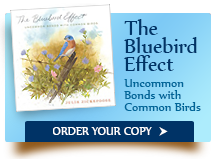
I got a thoughtfully posed question from a reader named Kathleen on June 22. I started to write my typical three-paragraph reply, then decided to save it for this post. It was that good a question, and it's something that's always in my mind as I work with these birds.
Kathleen wrote: The rehab centre I'm at has a policy of being as hands-off as possible with the animals to prevent socialization to humans, and we do our best to find same-species nestmates or role models, or barring those, at least a mirror to keep babies company. Julie, I've been reading your blog for a long time, and it seems like you take the opposite approach, being very hands-on with the young ones. Do you find that the babies you raise still go right back to being wild once they're on their own? Are they any different from young birds raised the way they are at the centre I'm at?
My answer:
Songbirds are different. I've been raising orphaned songbirds since 1982, and have had quite an array of foundlings successfully find their way back to the wild despite having had loving care from humans to start their lives (or restart them, after losing contact with their natural parents). Birds I have raised have paired with wild birds, raised their own young, and returned to visit in successive years. Cardinal, catbird, cedar waxwing, rose-breasted grosbeak, mourning dove, wood thrush, phoebe...the list goes on. Having been a small-scale rehabber, I have rarely had the good fortune to be able to group young of the same species or place them with conspecifics who will raise them as some larger rehab centers do. So I indulge myself, giving them the same kind of unfettered love I give my children or my domestic pets. I name them and I murmur to them. And when the time comes to release them, I kiss them on their heads and sever our ties very gently, over a period of weeks or even months. Three ruby-throated hummingbirds I raised stayed around the yard for a month and a half after release, coming back for feedings for three days, and after that simply visiting with me. They all migrated on schedule, and all three returned the following spring, resplendent in full ruby gorgets. They still knew their names, but there was no denying that they were full-fledged members of the hummingbird tribe, having flown across the Gulf of Mexico twice and found their way back to my doorstep. I'd call that a successful release.
Having done this for 28 years, I don't believe that refraining from becoming emotionally involved with the birds one raises; refraining from naming them or stroking them or murmuring endearments to them keeps them from identifying you as their mama. I think it's OK, and even desirable, to openly let an orphaned bird or animal know it is loved. I think the clinical approach is just a thin, semantic mask for a bond that must be present in order for a human to devote herself to the care of an orphaned bird. We're in hazy territory, I know, but I strongly believe that even a hummingbird needs to know someone cares for it and loves it. I believe they do better when they are loved. I don't think it hurts to sneak a nuzzle now and then, nor do I believe it shows disrespect for their wildness, as I've been admonished. Do you carry it around like a lapdog? Of course not. You feed it and show it you care, and leave it to its own devices in between.

I maintain that it is difficult if not impossible to keep from bonding with a bird you're feeding on the half-hour all day long. I don't know how it works for you, but that bond is what keeps me going, what allows me to turn my life completely upside down in service to a half-ounce bird, feeding it dawn to dusk, shopping at the grocery store in the middle of the night so I can be home to feed it. Why deny it exists? There's no need to get anthropomorphic about it, but why be coldly clinical about it? I suspect that such hands-off policies are aimed squarely at a rehabilitation organization's viewing public, so that these wild animals are not treated as or perceived as pets. I understand that and fully support it. They aren't pets. They're wild creatures slated for release and independence in their natural habitat. When one has a visiting public for which to model behavior, it's best that wildlife rehabilitation be presented that way.

But it's not how I work, and I'd submit that there are many ways to skin this cat. We're all working toward a successful release, but with songbirds, I believe we have the luxury of being a bit more relaxed about the imprinting issue than we do with raptors, waterfowl or galliniformes. Working alone or with the help of my daughter, I have been able to indulge my maternal instincts, shower my charges with love, and still keep in mind that they are ultimately wild and will return to the wild. Do my foundlings leave more slowly? Doubtless. And I believe that every minute, hour and day that a bird has to develop its flight muscles, foraging and survival skills and devote to simply figuring out how to live wild gives it an advantage over one that is simply abandoned when the rehabilitator thinks it's time. Release is a very dicey thing. Knowing when a bird is truly able to be self-sufficient is a skill that takes awhile to acquire. I'd doubt very much that most rehabilitators have the luxury of following an orphaned mourning dove along its path to independence for 60 days, as I did with Libby.
She found her own kind; she billed and cooed and preened with a same-age juvenile dove; she stopped landing on our heads; she became wild and wary and finally, while we were away on vacation, she left, perhaps for good. Or perhaps not. I look for her every day, and should I be blessed enough to lay eyes on her again, I'll know her, just as I knew the hummingbirds, the waxwing, the cardinal, the phoebe, the grosbeak and the wood thrush. It is a magical thing to be a bird's mother, to love it fully and to let it go, and to see it return of its own free will until it doesn't need to any more.

So, Kathleen, I can't say how it goes for the birds raised at your center, never having witnessed their release. I can't say how they differ from the birds I've raised. While they may not go "right back" to the wild, I can say that most of mine make it, having had the luxury of letting their instincts kick in slowly on their own, with full backup from their earthbound mama. I encourage them to linger, keeping food around at all times, but their wildness inevitably takes over, as they learn to take cues from the wild birds all around them. I go from Mom to just another human unit to be avoided, until that magic day weeks, months or years after release when I am approached by a free-living wild bird who comes up for a moment, just to say hello. For the months of effort and concern I've expended on its behalf, there could be no sweeter benediction.






24 comments:
Well said and heartwarming.
The photos of you and Libby tell as much of a story as your words Julie. Kathleen's questions niggld at the back of my mind too. I volunteered at a small wildlife rehab clinic a few years ago and we weren't allowed to speak or make eye contact with the critters there. Do you think it's different with adult ill or injured birds? Would you treat them differently?
Having raised and released just a few baby songbirds, I was so glad to read of your broader experience and know it's okay! In college I read and fell in love with "Arnie, the Darling Starling," and while he never "went wild," Arnie convinced me that even wild birds need love. The caution with waterfowl, raptors and gallinaceous birds duly noted....
Rehabilitation says to me care and feeding, comfort for a fellow Earthling, anything to give them the independence to live as they were meant to.
Nicely written and thoughtful piece.
To Love! To Love!
Beautifully written.
Touched to tears. Warm, fuzzy, and beautiful!
Dana
My experience, though not nearly as extensive as yours, reveals the same results as yours, Julie. Thank you for putting it so eloquently.
Injured or baby they appeciated the chance to live safely and then fly off healthy.
I know my share of rehabbers, and I have this to say:
Rehabbers are the ones we all run to when we encounter an animal that needs help. Rehabbers take in multitudes of mammals, reptiles and birds that more often than not, have run afoul of some human-made danger.
Rehabbers, unless they are affiliated with a center, fix these needy souls with money from their own pockets. They get bitten, scratched, pooped on.
They lose sleep, time with their families and sometimes a bit of their sanity, while caring for an injured animal. They pour their souls into the animal's care and when it's time to release the animal, either back to the wild or into the oblivion of death, they send a piece of themselves with it.
So if the rehabber wants to lavish a little love on the animal, by God they've EARNED IT.
And I can vouch for the "keep your distance from raptors". Imprinting may seem cool at first, but let a full-grown, horny great horned owl mate with your head and you will see how cool it isn't.
I love you and what you do, Julie. Rock on, sweetness.
I love this post and what you do for the wildlife! Definitely...to love.
You are absolutely the quintessential role model for loving care of wildlife. Any bird lucky enough to find itself in your hands has the best chance ever to be nurtured to good health and released. If a bird could write a blog post, it would sing your praises!
Very well said.
There's a tame mourning dove around the school/greenhouse where I work. He was obviously someone's pet. This bird did do the fall migration and came back to us. I feel really bad for him. I think he's imprinted on humans. He hangs out around the community garden, and if you sit in place long enough, he'll sit on your shoulder, and peck at your face, which is really cool. But I never see him hanging out with other mourning doves.
Except some of the gardeners are afraid of him and think he has rabies. LOL!
Warmth, breath, a heartbeat and food - consistently....essential for all warm-blooded creatures whether feathered or furred, or naked-skinned like us humans. I'd rather risk "over-nurture" and imprint than cold, clinical detachment and a scared soul. Anthropomorphizing? I'd be willing to admit the possibility. But after 30 years as a psychotherapist and wildlife rehabber I'd err on the side of nurture. You go, JulieZ.
What a wonderful post. Sounds like you've had some powerful inter-species connections over the years. I'm glad to hear that the songbirds do just fine in the wild even after a relationship with a human.
The story of your relationship with Libby has been a heart-warming one, Julie. And I emphasize the word "relationship." I wish that everyone could experience a bond of some sort with the wild creatures that we share this earth with - an honest, loving, and respectful connection. I'm not saying we should all play rehabber to orphaned birds, but simply reach out to those creatures who are not of our own kind, whether they be avian, reptilian, arachnid, etcetera, and to extend to them at least a smidgen of understanding, of empathy, of love. I applaud you for loving all of these birds with all your heart, and they obviously appreciate you for it. -Heather (of the Hills)
Oh Julie, I just love you and what you have to say. There is a lot going on that a lot of humans don't connect with. Thank heavens that you do. Really
For me, there would be one option. To love. It's so natural and powerful, described so perfectly here.
Wow, I feel honoured to have inspired a whole post! Thanks for thoroughly answering my question.
I find it really interesting that socialization is not a problem for the birds you raise (which is what I figured, since it's obvious you value their wildness). I'm sure it's possible to totally socialize a songbird to humans, but clearly it takes more than a kiss and a cuddle.
At the rehab centre I'm at, there is certainly a relationship that forms between us and the baby animals, even without cuddling etc. That relationship disappears pretty fast once they get into the large outdoor cages, though. We try to do a "soft" release for all our orphans by simply opening the cage door and providing food and shelter for them for as long as they choose to stick around. Most birds stay a few days or weeks. Last year we had some downy woodpeckers that kept coming back every few days for over six months! That was a really special experience - they even accepted handfeeding from those of us who had raised them, even though they avoided all other humans.
I think there's lots of room on the clinical/loving spectrum for different approaches to rehab, and as long as the outcome is a physically and mentally healthy animal with a good chance for survival, I'm all for it.
Do you and your readers know the Roches' song, "Her love is true beauty, and it radiates around"? Indeed, it does. Thanks.XOM.
the bevy of comments here are almost as touching as the post itself...
I admire you, Julie, but mostly I am grateful that you exist to give so much love to the creatures that make our lives interesting and wonderful. Thank you for being an adopted mama to so many.
"Love is something if you give it away, give it away, give it away.
Love is something if you give it away, you end up having more."
"Magic Penny"
Malvina Reynolds
I too feel that you need a nurturing love to begin with, to try to rescue anything orphaned and so fragile as a baby bird. Take love out of the mix, and you damage the psyche and release a bird who has never bonded and will not know how to bond, even with its own kind. Thats my theory anyway, nothing scientific, just a lot of years and baby birds later, I have found this to be the case.
Mary King
Forever Home Rescue and Sanctuary
meowinc.petfinder.org
great post! i took this year off from raising baby hummingbirds due to my 2nd child and can't wait to get back to it... especially after reading this :)
Post a Comment